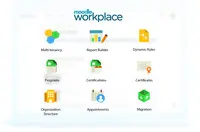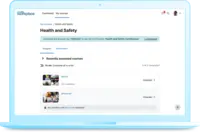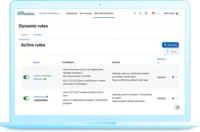Overview
What is Moodle?
Moodle is an open source learning management system with hundreds of millions of users around the globe and translated into over 100 languages, used by organizations to support their education and training needs.
Recent Reviews
Awards
Products that are considered exceptional by their customers based on a variety of criteria win TrustRadius awards. Learn more about the types of TrustRadius awards to make the best purchase decision. More about TrustRadius Awards
Popular Features
- Progress tracking & certifications (25)10.0100%
- Assignments (26)9.898%
- Learning administration (24)9.898%
- Course catalog or library (23)9.696%
Pricing
Entry-level set up fee?
- Setup fee optional
For the latest information on pricing, visithttps://moodle.com/pricing
Offerings
- Free Trial
- Free/Freemium Version
- Premium Consulting/Integration Services
Would you like us to let the vendor know that you want pricing?
86 people also want pricing
Alternatives Pricing
Product Demos
How to take Demo Assignment and appear in ESE-2020 by Moodle App from Mobile
YouTube
MEDIAL Plugin for Moodle - Demo Video
YouTube
Moodle Demo | Account Creation | Teacher View | Student View | Adding Resources | Joining Courses
YouTube
Moodle Webex Integration Demo
YouTube
French on an e-learning platform - Clip Class' Moodle
YouTube
Moodle Google Hangout Demo
YouTube
Features
Return to navigation
Product Details
- About
- Integrations
- Competitors
- Tech Details
- FAQs
What is Moodle?
Moodle is an open source learning management system that integrates with other platforms and can be customised for any teaching or training method. Moodle has solutions suitable for K-12, higher education, vocational training, corporates, as well as enterprise learning. The solution aims to improve teaching and student outcomes, as well as streamline training, onboarding, and compliance management, helping users to build more active and engaging online learning spaces.
Moodle users can get support from community forums, access Moodle's certified integrations, and explore over 1900 open source plugins. Or, for expert advice and end-to-end support and service, users can reach Moodle Certified Partners and Service Providers.
Moodle Features
Learning Management Features
- Supported: Course authoring
- Supported: Course catalog or library
- Supported: Player/Portal
- Supported: Learning content
- Supported: Mobile friendly
- Supported: Progress tracking & certifications
- Supported: Assignments
- Supported: Compliance management
- Supported: Learning administration
- Supported: Learning reporting & analytics
- Supported: eLearning
- Supported: Assessments
- Supported: Live online learning
- Supported: In-person learning
- Supported: Micro-learning
- Supported: Video learning
- Supported: eCommerce
- Supported: AICC-compliant
- Supported: SCORM-compliant
- Supported: Tin Can (xAPI) compliant
- Supported: Social learning
- Supported: Gamification
- Supported: GDPR Compliant Learning
- Supported: Single Sign On (SSO) Enabled Learning
Moodle Screenshots
Moodle Videos
What's new in Moodle LMS 4.0?
What's new in Moodle Workplace 4.0?
Moodle Integrations
Moodle Competitors
Moodle Technical Details
| Deployment Types | On-premise, Software as a Service (SaaS), Cloud, or Web-Based |
|---|---|
| Operating Systems | Windows, Linux, Mac |
| Mobile Application | Apple iOS, Android, Windows Phone, Blackberry, Mobile Web |
| Supported Countries | Worldwide |
| Supported Languages | All languages |
Frequently Asked Questions
Moodle is an open source learning management system with hundreds of millions of users around the globe and translated into over 100 languages, used by organizations to support their education and training needs.
Reviewers rate Learning content and Progress tracking & certifications highest, with a score of 10.
The most common users of Moodle are from Mid-sized Companies (51-1,000 employees).












